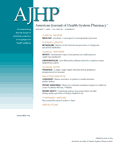 I read an interesting article today in the November 1, 2009 issue of the American Journal of Health-System Pharmacy (AJHP). In the article the authors report the results of survey sent to 200 hospitals in the US developed to assess the use of various informatics resources by pharmacy departments. The survey consisted of two-sections with a total of 20 questions. Only hospitals with at least 100 beds were included, and of the 200 surveys mailed only 114 were returned More information on the specifics of the survey can be found at the AJHP website here.
I read an interesting article today in the November 1, 2009 issue of the American Journal of Health-System Pharmacy (AJHP). In the article the authors report the results of survey sent to 200 hospitals in the US developed to assess the use of various informatics resources by pharmacy departments. The survey consisted of two-sections with a total of 20 questions. Only hospitals with at least 100 beds were included, and of the 200 surveys mailed only 114 were returned More information on the specifics of the survey can be found at the AJHP website here.
According the article “the majority of facilities were making use of a variety of informatics, including database mining for drug-use evaluations (n = 80, 70%), computerized drug information and a pharmacy Web page (n = 71, 62%), and computerized documentation of pharmacists’ intervention (n = 93, 82%). The majority of facilities also used clinical-rules engines for renal dosing (n = 78, 68%) and pharmacokinetics monitoring (n = 64, 56%); however, only 27 (24%) used antibiotic–pathogen matching-rules engines.†While I’m not surprised by the high percentage of pharmacies using informatics for data mining and pharmacists’ interventions, the high percentage of pharmacies utilizing a clinical-rules engine for renal dosing caught me off guard. Clinical-rules engines are typically very advanced pieces of software designed with specific pieces of logic coded by site specific programmers. They’re not as common as you might think. I would like to see the definition of clinical-rules engine used by the authors to better understand how they came up with this number.
Forty-seven percent of the hospitals responding to the survey had a pharmacist that specialized in informatics, and of that 47% only 0.5 FTE equivalents was dedicated to the position. The difficulties surrounding the use of advanced clinical systems and pharmacy automation puts a significant demand on resources, which is why I am disappointed to see such low numbers here. I can’t imagine not having a dedicated pharmacy informaticist at our facility. In fact, I’m in the process of developing a proposal to expand our pharmacy informatics team by 1.5 FTEs, bringing the total to 2.5 FTE equivalents for the department. The article did state that “the presence of an informatics specialist within the pharmacy department was associated with greater use of database mining (p = 0.028), use of renal-dosing-rules engines (p = 0.020), use of antibiotic–pathogen matching-rules engines (p = 0.014), and use of pharmacokinetic- monitoring rules engines (p = 0.026).†This makes sense as these duties often require specialized knowledge of the hospital’s information system as well as third party software tools. I found it strange, however, that there was “no significant association between the use of pharmacy informatics and facility teaching status (teaching versus nonteaching).†This bodes poorly for the profession in general as I would expect teaching facilities to be role models for other healthcare systems. A pleasant surprise though, was the data that showed that the lack of an informatics specialist did not affect the use of other technologies inside the pharmacies. This indicates that pharmacy departments are implementing technology regardless of their ability to hire specialists. Of course the downside to this is that “the majority of respondents indicated that their use of pharmacy informatics was not optimal.†Our facility suffers from the same inability to optimize systems one implemented. There are several reasons for this including lack of formalized education in informatics, too few resources and lack of understanding from administrative bodies.
The article concluded that “the use of clinical pharmacy informatics in patient care in acute care hospitals with at least 100 beds was significantly more likely when a pharmacy informatics specialist was present in the pharmacy. However, 4 in 10 hospital pharmacies did not employ a pharmacy informatics specialist.†I hope to see that trend change in the future. Any facility serious about taking advantage of pharmacy technology, informatics and automation has no choice but to consider the services of a pharmacy informatics specialist.
Leave a Reply